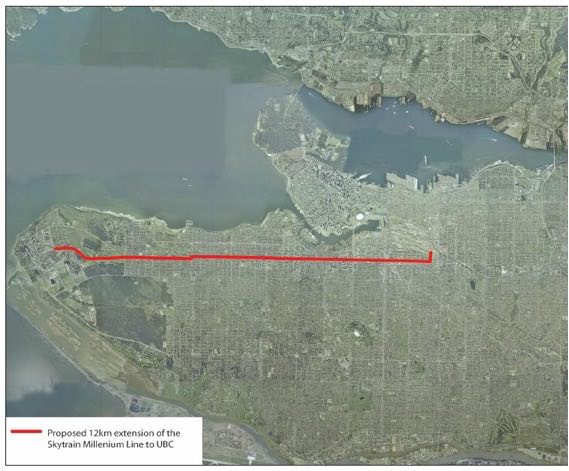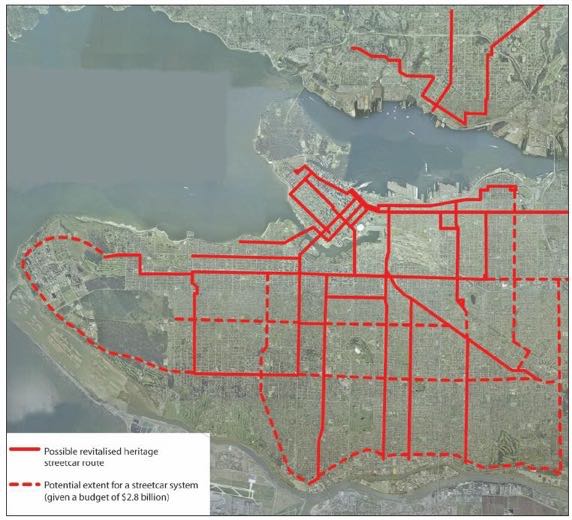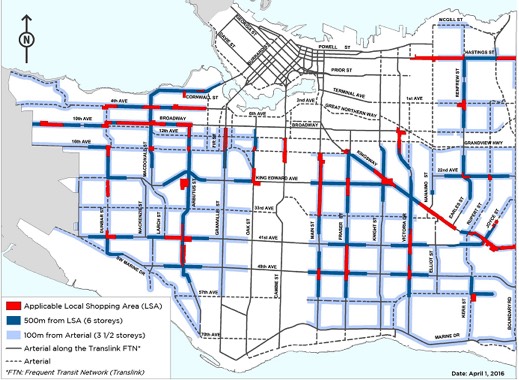On September 26, 2016, the Coalition of Vancouver Neighbourhoods sent the following letter to Premier Christy Clark regarding land use planning and transit funding.
As explained in the letter, CVN is strongly opposed to the use of development taxes or property taxes to fund transit, or policies that make increased development a requirement to receive transit funding.
Instead, CVN supports more affordable transit options as detailed in the Appendix below.
CVN represents a diverse group of nearly 30 neighbourhood associations all across the City of Vancouver.
September 26, 2016
Premier Christy Clark
Province of British Columbia
cc:
Hon. Rich Coleman (Minister of Natural Gas Development and Minister Responsible for Housing and Deputy Premier)
Hon. Peter Fassbender (Minister of Community, Sport and Cultural Development, Minister Responsible for TransLink)
Hon. Mary Polak (Minister of Environment)
City of Vancouver (Mayor and Council)
Translink (Board)
Metro Vancouver (Board)
Metro Vancouver region – all Mayors and Councilors
Re: BC Provincial transit and housing policies
The Coalition of Vancouver Neighbourhoods (CVN) is a coalition of resident associations from across the City of Vancouver. We are writing to you in response to concerns about recent reports of the province’s intention to use land based taxes to fund transit and to make increased development a condition of transit funding.
Since municipalities only get 7% of the tax base, while provincial and federal governments get 93%, we are opposed to the municipal tax base being further eroded. Municipalities mainly depend on property taxes and development fees to fund civic services and infrastructure. Transit is a provincial/federal responsibility for funding and the province should not be using either of these funding sources for transit. To do so is an unfair tax grab by the province.
Further, land use planning is the jurisdiction of municipal governments. It would undermine the public hearing process if the province were to make development rezoning a requirement of transit funding. Planning around transit should be based on local community planning processes, not on provincial interference in the municipal democratic process.
Therefore, we are strongly opposed to the use of development taxes (CACS or DCLs) or property taxes to fund transit or policies to make increased development a requirement of transit funding. Provincial insistence on this course would seriously jeopardize the municipal democratic process and infringe on municipal authority.
We do, however, support more affordable transit options as suggested in the Appendix below.
Sincerely,
Larry Benge, Chair
On behalf of the Coalition of Vancouver Neighbourhoods.
Member Groups of the Coalition of Vancouver Neighbourhoods
Arbutus Ridge Community Association
Arbutus Ridge / Kerrisdale / Shaughnessy Visions
Cedar Cottage Area Neighbours
Chinatown Action Group
Citygate Intertower Group
Community Association of New Yaletown
Crosstown Residents Association
Downtown Eastside Neighbourhood Council
Dunbar Residents Association
False Creek Residents Association
Grandview Woodland Area Council
Granville Burrard Residents & Business Association
Joyce Area Residents
Kitsilano-Arbutus Residents Association
Kits Point Residents Association
Marpole Oakridge Community Association
Norquay Residents
NW Point Grey Home Owners Association
Oakridge Langara Area Residents
Raycam
Residents Association Mount Pleasant Riley
Park/South Cambie Visions
Shaughnessy Heights Property Owners Association
Strathcona Residents Association
Upper Kitsilano Residents Association
West End Neighbours Society
West Kitsilano Residents Association
West Point Grey Residents Association
APPENDIX
TRANSIT
Negative impacts of transit tied to high density transit-oriented development
The Metro Vancouver Region’s designation of major transit infrastructure routes as Frequent Transit Development Areas (FTDA) encourages, requires and supports extremely high density development. This is the city and region’s proposed direction for the area referred to as the Broadway Corridor from Nanaimo/Commercial Drive to UBC, 4th Avenue to 16th Avenue. While this plan would involve a radical transformation of the Broadway Corridor and affected neighbourhoods, public consultation has been minimal with community input not reflected in the plan.
The proposed first phase of development of the Corridor is identified to be a subway from Vancouver Community College to Arbutus Street. If the first phase is approved, the city has indicated it would be also looking at land use designations west of Arbutus to UBC in anticipation of a phase two extension of a subway to UBC. This will have significant impacts on neighbourhoods in and surrounding the Broadway Corridor without their support.
Under this scheme for the Broadway Corridor, the City’s Transportation 2040 policies and the KPMG report propose that development could be similar to that of the Cambie Corridor, on the Oakridge Mall scale (redevelopment approval added 11 towers up to 45 storeys in height) as a model for sites such as the Jericho Lands. This scheme would not be an appropriate fit for our neighbourhoods and would destroy its existing character and not provide the kinds of medium density family-oriented housing that are so desperately needed in our city.
Worse yet is the very real possibility that neighbourhoods could be transformed by transit-oriented development and densification well in advance of transit infrastructure that may not be provided for decades, if ever. Meanwhile, intense levels of new development would add further congestion to the already severe impacts of UBC commuter traffic.
Amenities Starved for Transit Funds
Problems arise if subway funding is tied to a Public Private Partnership (P3) model, or if development is used to fund transit. These funding models would divert Community Amenity Contributions (CACs) paid by developers into funds that would pay for transit rather than for amenities for the community and its increased population. This is an unacceptable form of downloading the cost of transit onto cities and communities.
The Future of Transit
It is by no means certain that, in the long term, future transit systems will be dominated by large scale high cost projects. It is clear from the recent transit plebiscite that the public is fed up with continually paying for high cost transit, and is demanding more accountability.
Proponents of a Broadway Corridor subway would like to boil the choice of options down to efficiency and “megaproject” economic stimulus. However, the broader implications of competing public transit visions for Vancouver and its neighbourhoods are vastly more complicated and significant.
There are other options to promoting a nodal pattern of high-rise development through high-cost underground rapid transit on a single corridor. Others advocate for a high-capacity, at-grade transit network that is more evenly distributed and reinforces a pattern and scale of urban development that is more affordable, livable, socially productive and supports businesses on a broader city-wide scale.
Studies have shown that a more evenly distributed transit network is also more cost effective (see below results of a UBC- based study). These studies indicate that it is also vastly more sustainable from an environmental perspective to replace existing fossil- fuelled diesel buses with a combination of higher-capacity, zero-emission electric streetcars and articulated trolleybuses. The existing transit grid could have more frequent transit and expanded routes throughout the city and on key routes of heavy demand.
For the price of this….

We can have this…

Equivalent electric streetcar network deliverable for same cost of proposed Broadway Corridor subway
(Condon, et al, 2008, The case for the tram; learning from Portland, Sustainability by Design – An examination of alternatives to an underground extension of the Millennium Line to UBC, Foundational Research Bulletin, No. 6.)
How This Affects Us
There is a real danger that our neighbourhoods, and in particular larger sites such as the Jericho Lands, could be planned and built based on an outdated approach and faulty assumptions. Many informed sources suggest that a nodal based approach to transit, based on transit megaprojects and high rise development, is probably not the way of the future as some have suggested.
The Federal Liberal Party platform said only that they would support “rapid” transit on Broadway, but rapid transit can take a variety of forms other than a subway. Rapid transit could instead be streetcars or rapid electric trolley buses, or other combinations of grade level transit at a fraction of the cost as noted in the example above.



